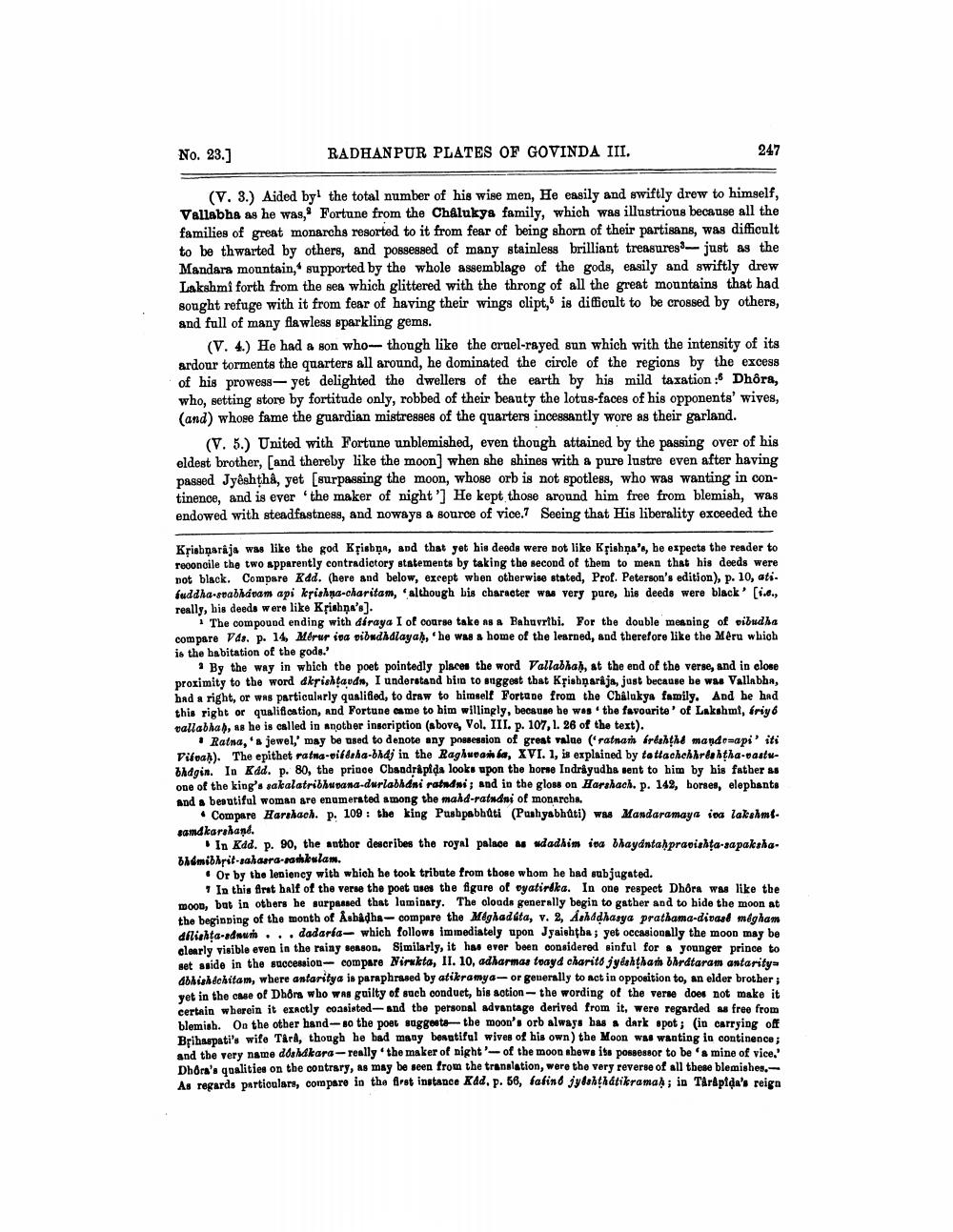________________
No. 23.)
RADHANPUR PLATES OF GOVINDA III.
247
(V. 3.) Aided by the total number of his wise men, He easily and swiftly drew to himself, Vallabha as he was, Fortune from the Chalukya family, which was illustrious because all the families of great monarchs resorted to it from fear of being shorn of their partisans, was difficult to be thwarted by others, and possessed of many stainless brilliant treasures:-- just as the Mandara mountain, supported by the whole assemblage of the gods, easily and swiftly drew Lakshmi forth from the sea which glittered with the throng of all the great mountains that had sought refuge with it from fear of having their wings clipt, is difficult to be crossed by others, and full of many flawless sparkling gems.
(V. 4.) He had a son who though like the cruel-rayed sun which with the intensity of its ardour torments the quarters all around, he dominated the circle of the regions by the excess of his prowegs- yet delighted the dwellers of the earth by his mild taxation : Dhora, who, setting store by fortitude only, robbed of their beauty the lotus-faces of his opponents' wives, (and) whose fame the guardian mistresses of the quarters incessantly wore as their garland.
(V. 5.) United with Fortune unblemished, even though attained by the passing over of his eldest brother, (and thereby like the moon] when she shines with a pure lustre even after having passed Jyêshtha, yet (surpassing the moon, whose orb is not spotless, who was wanting in continence, and is ever the maker of night'] He kept those around him free from blemish, was endowed with steadfastness, and noways a source of vice.7 Seeing that His liberality exceeded the
Krisbnaraja was like the god Krishna, and that yet his deeds were not like Krishna's, be expects the reader to reconcile the two apparently contradictory statements by taking the second of them to mean that his deeds were not black. Compare Kdd. (hero and below, except when otherwise stated, Prof. Peterson's edition), p. 10, ati. fuddha-svabhavam api krishna-charitam, although bis character was very pure, bis deeds were black' (1.., really, his deeds were like Krishna's).
The compound ending with diraya I of course take as a Bahavribi. For the double meaning of vibudha compare Vas. p. 14, Merur ina vibudidlayah, he was a home of the learned, and therefore like the Meru which is the habitation of the gods.'
By the way in which the poet pointedly places the word Vallabhah, at the end of the verse, and in close proximity to the word dkrishtavdn, I understand bin to suggest that Krishnaraja, just because be was Vallabha, had a right, or was particularly qualified, to draw to himself Fortape from the Chalukya family. And be had this right or qualification, and Fortune came to him willingly, because he was the favourite of Lakshmi, friy 6 vallabhah, as he is called in another inscription (above, Vol. III. p. 107, 1. 26 of the text).
Ratna,' s jewel,' may be used to denote any possession of great value (ratnan freshthe mando-api' iti Vivah). The epithet ratna-vildaha-budy in the Raghuvan la, XVI. 1, is explained by ta tlachchhrlehtha-vastubhdgin. In Kdd. p. 80, the pripoo Chandrápida looks apon the horse Indrayudha sent to him by his father as one of the king's sakalatribhupana-durlabhani ratndni; and in the gloss on Harshack. p. 142, borses, elephants and a beutiful woman are enumerated among the mahd-ratudni of monarchs.
Compare Harolach. p. 109: the king Pushpabhati (Pashyabhati) was Mandaramaya ina lakshmisamdkarshand.
In Kad. p. 90, the author describes the royal palace as ndadhim ina bhayantahpravishta-sapakshabhumibhrit-sahasra-nathulam.
• Or by the leniency with which he took tribute from those whom he had subjugated.
In this first half of the verse the poet uses the figure of oyatirdka. In one respect Dhôra was like the moon bat in others be surpassed that laminary. The clouds generally begin to gather and to hide the moon at the beginning of the month of Asbadha- compare the Meghadáta, v. 2, Lahadhasya prathama-divasd mégham aflishta-adwuh... dadaria- which follows immediately upon Jyaichtba; yet occasionally the moon may be clearly visible even in the rainy sonson. Similarly, it has ever been considered sinful for younger prince to set aside in the succession compare Nirukta, II. 10, adharmas toayd charito jylahthar bhrdtaram antarity abhishdohitam, where antaritya in paraphrased by atikramya-or generally to act in opposition to an elder brother ; vet in the case of Dhors who was guilty of such conduet, bis action-the wording of the verse does not make it certain wherein it exactly coasisted - and the personal advantage derived from it, were regarded as free from blemish. On the other hand-80 the poet saggets the moon's orb always bas a dark spot; (in carrying off Brihaspati's wifo Tara, though he bad many beatiful wives of his own) the Moon was wanting in continence; and the very name dandkara-really the maker of night'-of the moon shews its possessor to be 's mine of vice." Dhöra's qualities on the contrary, as may be seen from the translation, were the very reverse of all these blemishes.As regards partioulars, compare in the first instance Kdd. p. 56, fafind jy&shthátikraman; in Tarapida's reiga




